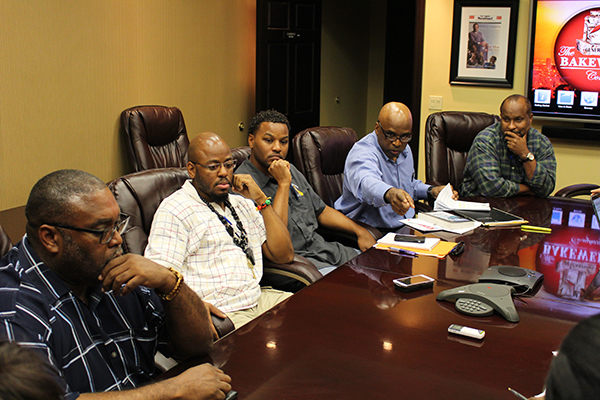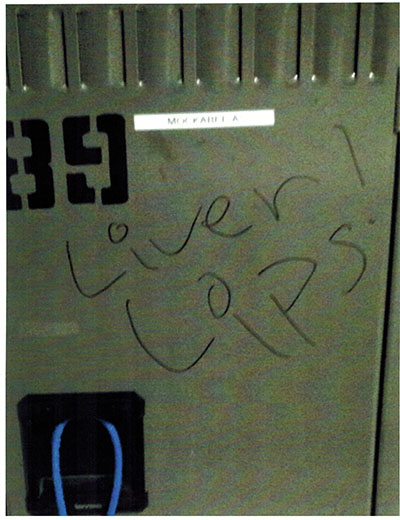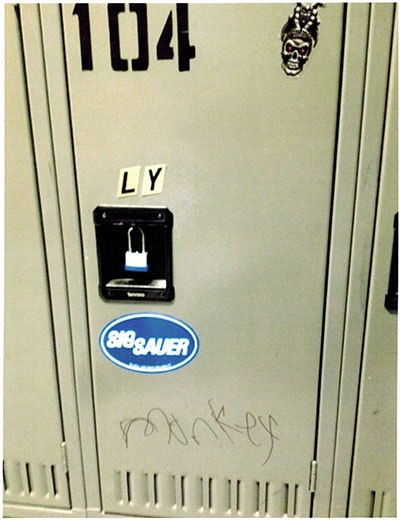African American Agents report multiple cases of racism and sexual discrimination by Homeland Security Management.

As administration officials start to implement President Obama’s immigration sweep actions, there are some issues that internal federal departments such as Los Angeles’ Department of Homeland Security needs to address, according to local agents.
A series of written complaints of discrimination have been filed to the Equal Employment Opportunity Commission about the practices held by L.A.’s Immigration and Customs Enforcement management and agents. ICE agents Anthony Mockabee, Immigration Enforcement Agent (IEA) Randolph, Federal Law Enforcement Officer Erveno Myles, ICE Chef Joe Bivins and ICE Chef Robert Hunt gave their accounts about the racial climate in the department.
On July 9, 2013, two African American ICE Agents discovered racially motivated hate language drawn on their lockers. IEA Anthony Mockabee, 31, and IEA Randolph’s, personal lockers were allegedly vandalized with the labels “monkey” and “liver lips.” Both agents found the language to be highly offensive and decided to take pictures of the alleged writings. They soon reported the misconduct the same day of its discovery.

“When the incident happened I honestly didn’t know what to do because I don’t know who to trust in management,” said Mockabee. “There have been incidents in the past that arose from confrontations and management didn’t do what they were probably required to do.”
Agents and employees who have electronic keys to the area can only access the agent assigned locker room. The process of actually getting to the room requires passage through a secured jail area and two sets of doors that require the electronic key. So, the chances of an outside person or someone employed in another department vandalizing the premises are slim to none.
Mockabee and Randolph allegedly claim prior to the locker vandalism a confrontation of verbal abuse from a fellow agent, who is of Hispanic descent, initiated a physical altercation towards him. Several months later the locker incident occurred.

“That’s what happens when you report things in our department. When you file a complaint you become an enemy to the people you filed against and the people they are buddies with in upper management,” said Randolph. Agent Randolph has worked with the department since 2008. “That whole department is run by favoritism. Agents who are friends or family of one another don’t see reprimands when it comes to their faults,” he said.
For IEA Randolph, this wasn’t the first encounter of racism. He took matters into his own hands and filed several complaints to EEOC about how he was being treated by upper management and other agents. Yet, he says he was subjected to “harassment and ridicule,” by management at the agency, when he proceeded to file complaints.
Supervisor to the agents John Chavez stated in an affidavit that the writing on the lockers was removed four hours after they were discovered. He stated he was disappointed in management techniques and abilities to address this situation. In most cases, the department conducts an investigation of these sorts as soon as possible to assess evidence and report it to upper management.
From their personal accounts, Mockabee and Randolph recalled being asked to provide writing samples to see if the two did the crime. The department then claims it started an investigation immediately, but had no success with finding the perpetrator.
In regards to the locker investigation, Assistant Field Officer Director (AFOD) Arturo Trevino stated that he didn’t see anything wrong with the word “monkey.” In an investigative questionnaire concerning the complaint Trevino stated, “I have used the term ‘monkey’ to describe and actually call my grandchildren when they are at play (jumping, climbing and not being still). I have also heard others use that word as a term of affection, but I can see how it could be considered a derogatory term.”
This racially motivated incident only unveiled the underlying issues of alleged racial tension, sexual discrimination and suspected poor management in L.A.’s ICE department. In a 2012 demographics report, the Los Angeles ICE field office has 433 employees. About 35% of the employees are Hispanic, 35% White, 9% African American and 14% Asian. But, these percentages sum up the whole department such as regular staff, agents and caseworkers; it does not break down the demographics of immigration enforcement agents.
“The department only has about eight Black agents. That’s it. We don’t have any person in upper management that represents us and we don’t have that support in office,” said Chef Jevon Bivins. He has been with the immigration offices for 19 years. “The majority of the upper management staff is Hispanic and it has been like that for years. Whenever you bring something to them, they push it behind them. When you’re Black and you work in ICE you’re more than likely going to get fired.”
IEA Randolph’s filed cases are in the beginning stages of investigation with the EEOC. His case alleges job discomfort “racial discrimination and emotional stress.” An imbalance his work experience has caused Randolph to seek medical care and supervision from both a general physician and therapist. Medical documents state that Randolph has experienced heart palpitations, anxiety and depression due to his treatment at work.
The department’s Western Regional Communications Director Virginia Kice issued this statement in regards to the locker incident, “In the wake of the 2013 incident, ICE’s Office of Professional Responsibility conducted a thorough investigation, but was unable to identify the individual or individuals responsible. Additionally, the agency’s Office of Diversity and Civil Rights was contacted about the matter, but pending litigation prevents us from commenting further.”
In a report filed by Field Office Director John Longshore, Randolph was terminated for lack of candor, failure to fully cooperate with an official investigation and conduct of unbecoming for an incident that occurred in March 2013. An alleged letter was sent to a fellow agent in the ICE department who participated in the investigative for Randolph “threatening” him. The envelope for the letter was tested for palm prints samples from Randolph and seven other agents***. Randolph’s prints were found on the mail.
“I touch mail all the time. We all pass through mail several times a day, so why would they single me out from everyone else and only take my palm print with a few others. Why not the whole department?” said Randolph. “Stuff like this messes with my sanity and life. This is what I’m good at and what I’ve wanted to do my whole life. I don’t want my skills to be taken away from me.”
On November 18, IEA Randolph lost his job and his personal peace.
“I can’t eat or sleep because of this. This is my career that is just finished because of the actions of others. No one likes to be discriminated against and no one wants to be in a work environment that continues to do that. But, I am good at my job and all of the judges I’ve worked with can attest to that,” said Randolph with tears in his eyes.
Just like Randolph, there remains a group of African American agents who fear for the loss of their jobs because they speak up about the alleged racism they face.
Officer Erveno Myles claims he has faced sexual discrimination from AFOD Bob Naranjo on several occasions. On March 19, Myles was a victim of domestic violence by his former partner. As a result of his abuse, he suffered injuries and filed a protective order against his partner for safety. He informed Naranjo about his domestic altercations and soon enough his former partner was found in the ICE offices making complaints against Myles. This caused ICE management to temporarily revoked Myles’ authority as an officer.
Soon after he was reinstated, Myles claims that his supervisor paraded him around the office asking staff members if he looked and acted gay. “His comments really led to a hostile work environment for me,” said Myles. Myles accounts that in May Naranjo approached him near the office elevators and asked him to accompany him at lunch. The two ate lunch at Tommy Pastrami in downtown Los Angeles where Naranjo allegedly made comments to Myles as “easily influenced and an opportunist” for filing a complaint against upper management. He claims that Naranjo continued to criticize his decision for the remainder of the lunch.
“I advised AFOD Naranjo almost tearfully that I was a victim and had no other avenues to redress his claims. He kept asking me ‘how do you think this will look for the rest of your career with this stigma?’ That literally took me back as an insult to the future of my job,” said Myles. His complaints are currently in the mediation phases of an EEO review.
The U.S. ICE department has committed to conducting additional reviews aimed to these cases and are “committed to safeguarding the civil rights of all ICE stakeholders, including employees.”
“All we want is change for our families and for those who come after us. Things of the past shouldn’t be the future of others,” said Chef Robert Hunt.
*For discretion of the article Agent Randolph was addressed as “IEA Randolph” for non-disclosure of his full name.
Update: December 19, 2014
***Correction: OPR reported of 9 prints that were on the letter, 2 belong to Randolph and the other 7 were unidentifiable.






